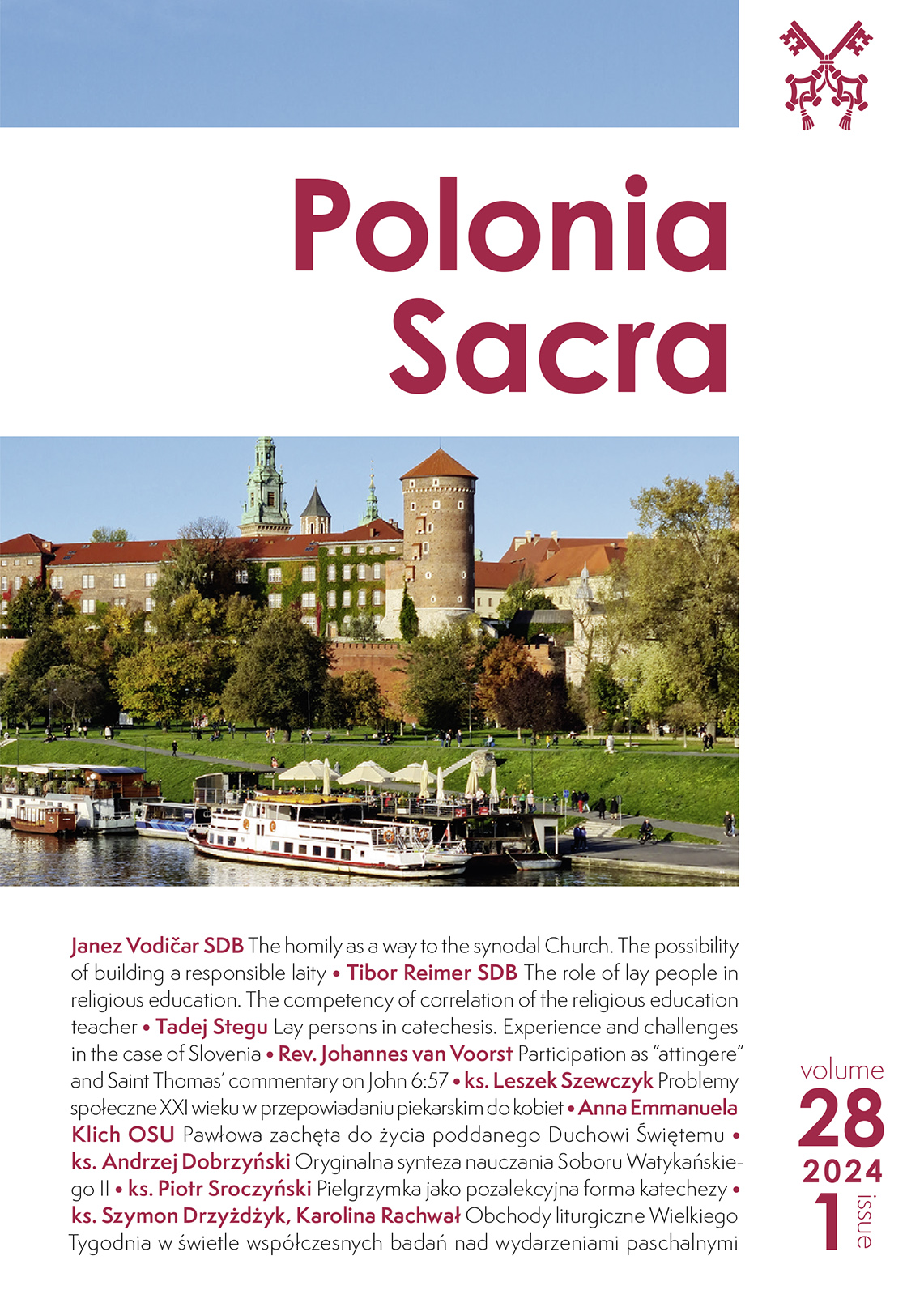Liturgical Celebrations of Holy Week in the Light of Contemporary Research on Paschal Events
DOI:
https://doi.org/10.15633/ps.28109Keywords:
Eucharist, Last Supper, Easter, Holy WeekAbstract
Holy Week, crowned by the Resurrection from the dead, has for centuries been the most important liturgical event of the year. In terms of importance, it can only be compared to the Lord’s Day — Sunday. Both celebrations have their origins in Judaism, where the Sabbath and Passover were treated similarly. The Sabbath was a day for the Lord, and Passover was the most important festival. The saving events are conditioned by historical time, as recorded by the Evangelists. Unfortunately, despite the accuracy of the Gospel authors, it is still difficult to establish a precise chronology, or even to indicate the year in which the crucifixion took place. In the following article, the formation of the Holy Week tradition is presented together with a historical reference as well as three contemporary proposals of dating the Passion. The initial stage was the so-called dispute over the date of Easter and it has also been presented first. Then the dynamic development of the tradition of Holy Week in the fourth century, and finally the most recent historical research covering the chronology of the Paschal events.
References
Akta synodalne 381–431, oprac. A. Baron, H. Pietras, Kraków 2010 (Synody i Kolekcje Praw, 4).
Akta synodalne 50–381, oprac. A. Baron, H. Pietras, Kraków 2006 (Synody i Kolekcje Praw, 1).
Augustyn z Hippony, Kazanie 218 „Na Wielki Piątek”, Warszawa 1973 (Pisma Starochrześcijańskich Pisarzy, 12).
Balthasar H. von, Teologia misterium paschalnego, Kraków 2001.
Chryzostom Jan, Kazanie na Wielkanoc, oprac. J. Salij, S. Bojarski, Warszawa 1971 (Pisma Starochrześcijańskich Pisarzy, 8).
Cyryl Jerozolimski, Katecheza 18: W jeden, święty, powszechny Kościół, oprac. M. Bogucki, Kraków 2000 (Biblioteka Ojców Kościoła, 14).
Didache, oprac. M. Starowieyski, Kraków 1988 (Ojcowie Żywi, 8).
Didaskalia Apostolorum, oprac. H. Connolly, Oxford 1929.
Dokumenty Soborów Powszechnych, t. 1, oprac. A. Baron, H. Pietras, Kraków 2007.
Egeria, Pielgrzymka do miejsc świętych, Kraków 1996 (Ojcowie Żywi, 13).
Euzebiusz z Cezarei, Historja kościelna, oprac. A. Lisiecki, Poznań 1924 (Pisma Ojców Kościoła, 3).
Euzebiusz z Cezarei, Życie Konstantyna, oprac. T. Wnętrzak, Kraków 2007 (Źródła Myśli Teologicznej, 44).
Hahn S., Czwarty Kielich. Odkrywanie tajemnicy Ostatniej Wieczerzy i krzyża, Kraków 2018.
Humphreys C., The mystery of the Last Supper, Cambridge 2011.
Humphreys C., Waddington W., The Date of the Crucifixion, https://www.asa3.org/ASA/PSCF/1985/JASA3-85Humphreys.html (27.12.2021).
Jaubert A., La date de la Cène, Paris 1957.
Kanony ojców greckich, oprac. A. Baron, H. Pietras, Kraków 2009 (Synody i Kolekcje Praw, 3).
Konstytucje apostolskie, oprac. A. Baron, H. Pietras, Kraków 2007 (Synody i Kolekcje Praw, 2).
La Greca F., De Caro L., Aprofondimenti sulla nascita di Gesù nell’1 A. D. e sulla datazione della crocifissione nel 34, „Annales Theologici” 34 (2020) nr 1, s. 13–58, DOI: https://doi.org/10.3308/ath.v34i1.450.
Lessing H., Die Abendmahlsprobleme im Lichte der neutestamentlichen Forschung seit 1900, t. 1, Bonn 1953.
Lijka K., Dzieje Triduum Paschalnego. Historia liturgii, red. W. J. Świerzawski, Zawichost 2012, s. 101–124 (Mysterium Christi, 2).
Meier J., A Marginal Jew. Rethinking the Historical Jesus: The Roots of the Problem and the Person, t. 1, Doubleday, New York 1991.
Nadolski B., Liturgia, t. 2, Poznań 1991.
Naumowicz J., Trzy spory o datę Wielkanocy, „Vox Patrum” 26 (2006) t. 49, s. 453–470, DOI: https://doi.org/10.31743/vp.8228.
Orygenes, Komentarz do Ewangelii według św. Jana, red. A. Bandura, A. Baron, T. Górski, H. Pietras, E. Stańska, Kraków 2003 (Źródła Myśli Teologicznej, 27).
Pitre B., Jezus i żydowskie korzenie Eucharystii, Kraków 2018.
Post jako praktyka duchowa. Ojcowie Kościoła o poście, oprac. L. Nieścior, Kraków 2019 (Biblioteka Ojców Kościoła).
Proniewski A., Ostatnia Wieczerza w kontekście żydowskiej uczty paschalnej, „Rocznik Teologii Katolickiej” 6 (2007), s. 57–67, DOI: 10.15290/rtk.
Ratzinger J., Jezus z Nazaretu, t. 2: Od wjazdu do Jerozolimy do Zmartwychwstania, przekł. W. Szymona, Kielce 2011.
Starowieyski M., Przedmowa, oprac. P. Iwaszkiewicz, Kraków 1996 (Ojcowie Żywi, 13).
Szczęśniak W., Dzieje Kościoła katolickiego w zarysie, Warszawa 1906.
Tertulian, O poście przeciwko psychikom, tłum. E. Stanula, Warszawa 2007, s. 177–196 (Pisma Starochrześcijańskich Pisarzy, 65).
The Panarion of Epiphanius of Salamis, Book II and III. De Fide, oprac. F. Williams, Leiden–Boston 2013 (Nag Hammadi and Manichean Studies, 79).
Vogüé A. de, Kochać post, Kraków 2010.
Wróbel M., Historia i teologia czwartej Ewangelii w świetle „Żydów” Janowych, „Colloquia Theologica Ottoniana” 1 (2018), s. 107–145, https://doi.org/10.18276/cto.2018.1-05.
Downloads
Published
Issue
Section
License
Copyright (c) 2024 Szymon Drzyżdżyk, Karolina Rachwał

This work is licensed under a Creative Commons Attribution 4.0 International License.
Authors who publish in this journal agree to the following terms:
- Authors retain the copyright and full publishing rights without restrictions and grant the journal right of first publication with the work simultaneously licensed under a Creative Commons Attribution 4.0 International License that allows others to share the work with an acknowledgement of the work's authorship and initial publication in this journal.
- Authors are able to enter into separate, additional contractual arrangements for the non-exclusive distribution of the journal's published version of the work (e.g., post it to an institutional repository or publish it in a book), with an acknowledgement of its initial publication in this journal.
- Authors are permitted and encouraged to post their work online (e.g., in institutional repositories or on their website) prior to and during the submission process, as this can lead to productive exchanges, as well as earlier and greater citation of published work (See The Effect of Open Access).

